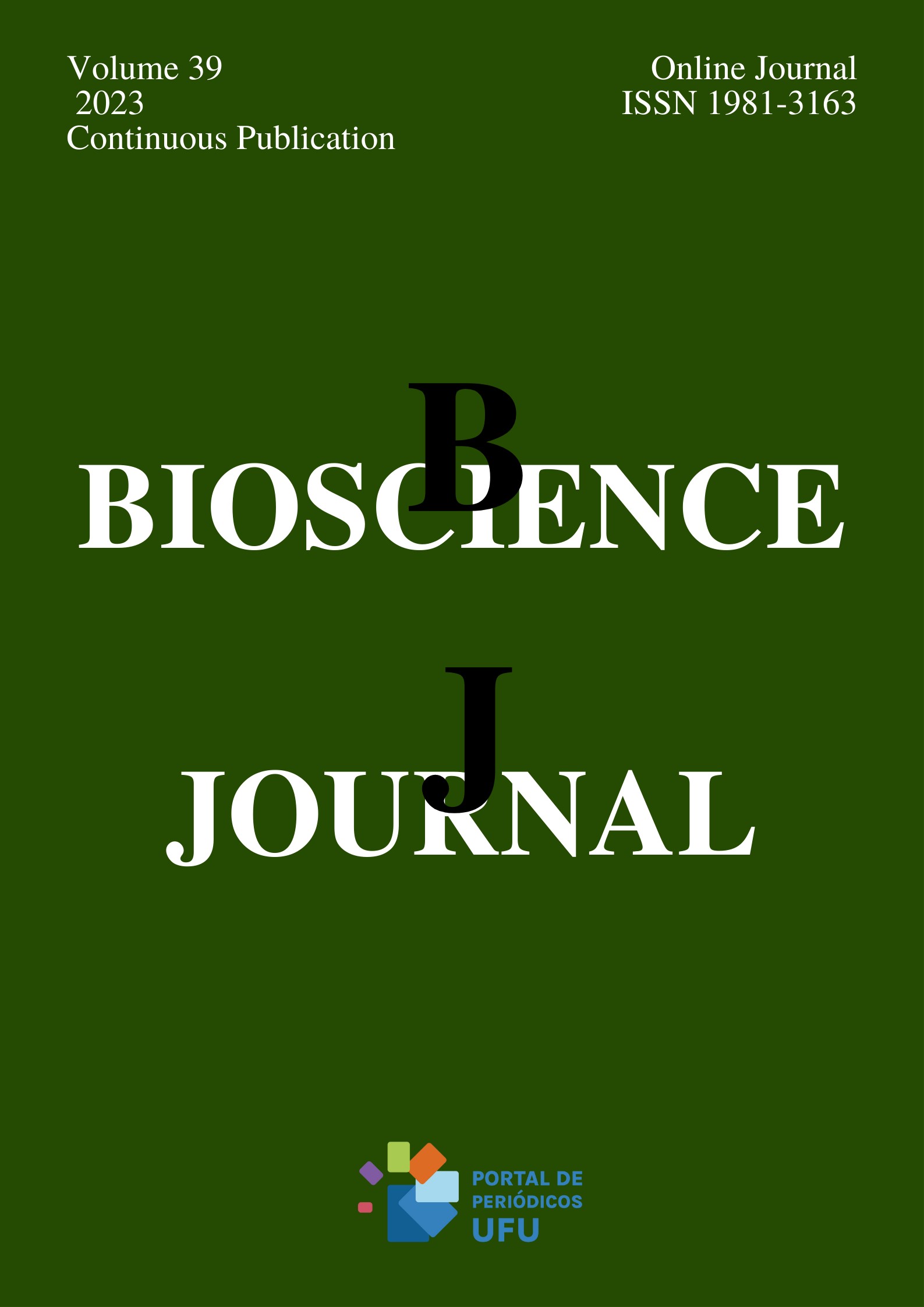Fermentative losses and lactic acid content of elephant grass silages added with macaúba cake
DOI:
https://doi.org/10.14393/BJ-v39n0a2023-62854Keywords:
Additives, Animal feed, Biodiesel, Co-products, Fermentation.Abstract
Elephant grass is indicated for silage production but requires additives to increase dry matter content because it reduces the production of effluents, potentially improves the fermentation pattern, and preserves the nutrients of the silage. This study aimed to evaluate the effects of including macaúba cake in elephant grass ensilage on dry matter content, lactic acid bacteria population, lactic acid production, pH values, losses by gases and effluents, and dry matter recovery. The experimental design was completely randomized, in a 3x6 factorial scheme, with three levels of inclusion of macaúba cake (0, 10, and 20%) and six opening times (1, 5, 10, 20, 40, and 60 days after ensilage), with four repetitions. Macaúba cake was an effective moisture-absorbing additive, increasing dry matter content, lactic acid bacteria population, and lactic acid content and reducing the pH. The losses by effluents and gases decreased, and dry matter recovery increased with the addition of this biodiesel co-product. The 20% level of inclusion of macaúba cake in elephant grass ensilage allowed for better preserving the ensiled material.
References
ANDRADE, P.A., et al. Aspectos qualitativos da silagem de capim-elefante com fubá de milho e casca de soja. Semina: Ciências Agrárias. 2012. 33(3), 1209-1218. https://doi.org/10.5433/1679-0359.2012V33N3P1209
AZEVEDO, J.C., et al. Fruit agribusiness waste as an additive in elephant grass silage. Semina: Ciências Agrárias. 2017. 38(4), 1987-2000. https://doi.org/10.5433/1679-0359.2017V38N4P1987
BARCELOS, A.F., et al. Valor nutritivo e características fermentativas da Silagem de capim-elefante com diferentes proporções de Casca de café. Ciência Animal Brasileira. 2018. 19, 1-12. https://doi.org/10.1590/1809-6891v19e-27432
BONFÁ, C.S., et al. Evaluation of sugarcane silages added with macaúba cake. Acta Scientiarum. Animal Sciences. 2018. 40, e37571. https://doi.org/10.4025/actascianimsci.v40i1.37571
BONFÁ, C.S., et al. Chemical composition of sugarcane silages added with crambe bran. Ciência e Agrotecnologia. 2020. 44, e016920. https://doi.org/10.1590/1413-7054202044016920
CARDOSO, A.M., et al. Elephant grass silage with the addition of crambe bran conjugated to different specific mass. Acta Scientiarum. Animal Sciences. 2016. 38(4), 375-382. https://doi.org/10.4025/actascianimsci.v38i4.31828
CRUZ, C.D. Genes: a software package for analysis in experimental statistics and quantitative genetics. Acta Scientiarum. Agronomy. 2013. 35(3), 271-276. https://doi.org/10.4025/actasciagron.v35i3.21251
DETMANN E, SOUZA MA, VALADARES FILHO SC, QUEIROZ AC, BERCHIELLI TT, SALIBA EOS, CABRAL LS, PINA DS, LADEIRA MM & AZEVEDO JAG. Métodos para Análise de Alimentos - INCT - Ciência Animal. Visconde do Rio Branco: Suprema, 2012. 214 p.
EVANGELISTA, A.R., et al. Produção de silagem de Capim-Marandu (Brachiaria brizantha stapf cv. Marandu) com e sem emurchecimento. Ciência e Agrotecnologia. 2004. 28(2), 443-449. https://doi.org/10.1590/S1413-70542004000200027
FURTADO, R.N., et al. Fermentative losses and chemical composition of elephant grass silage added with castor bean hull. Revista Ciência Agronômica. 2019. 50(1), 140-147. https://doi.org/10.5935/1806-6690.20190017
GUIMARÃES, C.G., et al. Fermentation characteristics of elephant grass silages with macaúba cake. Acta Scientiarum. Animal Sciences. 2018. 40, e42523. https://doi.org/10.4025/actascianimsci.v40i1.42523
JOBIM, C.C., et al. Avanços metodológicos na avaliação da qualidade da forragem conservada. Revista Brasileira de Zootecnia. 2007. 36, 101-119. https://doi.org/10.1590/S1516-35982007001000013
KUNG JR, L. Preparation of silage water extracts for chemical analyses: Standard operating procedurs. Worrilow: University of Delaware, 1996. 309 p.
MCDONALD P., HENDERSON, A.R. and HERON, S.J.E. The biochemistry of silage. 2ª ed. Marlow: Chalcombe Publication, 1991. 340 p.
MOCHEL FILHO, W.J.E., et al. Produtividade e composição bromatológica de Panicum maximum cv. Mombaça sob irrigação e adubação azotada. Revista de Ciências Agrárias. 2016. 39(1), 81-88. https://doi.org/10.19084/RCA14154
OUDE ELFERINK, S.J.W.H. et al. Silage fermentation processes and their manipulation. In:FAO Electronic Conference on Tropical Silage, Rome, 1999. Silage making in the tropics withemphasis on smallholders; Proceedings… Rome: FAO, 17-30, 2000.
PACHECO, W.F., et al. Perdas fermentativas de silagens de capim-elefante (Pennisetum purpureum schum.) com níveis crescentes de feno de gliricídia (Gliricidia sepium). Acta Veterinária Brasilica. 2014. 8(3), 155-162. https://doi.org/10.21708/avb.2014.8.3.3289
SILVA, T.C., et al. Populações microbianas, perfil fermentativo e composição de silagens de capim-elefante com jaca. Archivos de Zootecnia. 2011. 60(230), 247-255. https://dx.doi.org/10.4321/S0004-05922011000200009
TEIXEIRA, U.B.G., et al. Potencial de utilização de coprodutos agroindustriais para suplementos. Revista Eletrônica Nutritime. 2014. 11(2), 3363-3386.
VIANA, P.T., et al. Losses and nutritional value of elephant grass silage with inclusion levels of cottonseed meal. Acta Scientiarum. Animal Sciences. 2013. 35(2), 139-144. https://doi.org/10.4025/actascianimsci.v35i2.13736
VILELA, D. and VEIGA, V. M. de O. A silagem e seus riscos. Juiz de Fora: Embrapa Gado de Leite, 2003. 6 p. (Embrapa Gado de Leite. Comunicado técnico, 33).
ZANINE, A.M., et al. Evaluation of elephant grass silage with the addition of cassava scrapings. Revista Brasileira de Zootecnia. 2010. 39(12), 2611-2616. https://doi.org/10.1590/S1516-35982010001200008
ZOPOLLATTO, M., DANIEL, J.L.P. and NUSSIO, L.G. Aditivos microbiológicos em silagens no Brasil: revisão dos aspectos da ensilagem e do desempenho de animais. Revista Brasileira de Zootecnia. 2009. 38(suplemento especial), 170-189. https://doi.org/10.1590/S1516-35982009001300018
Downloads
Published
Issue
Section
License
Copyright (c) 2023 Cíntia Gonçalves Guimarães, Caroline Salezzi Bonfá, Antônio Ricardo Evangelista, Alexandre Soares dos Santos, Lílian de Araújo Pantoja, Amanda Gonçalves Guimarães, Marcos Aurélio Miranda Ferreira

This work is licensed under a Creative Commons Attribution 4.0 International License.





